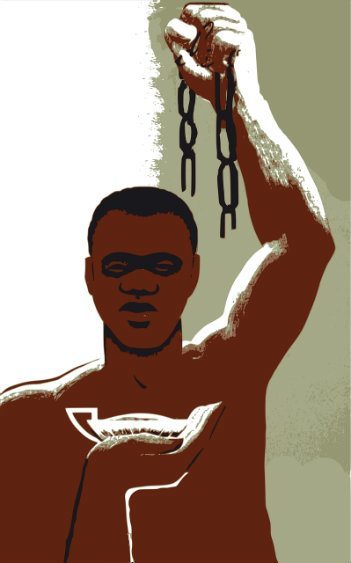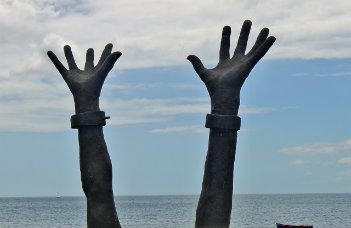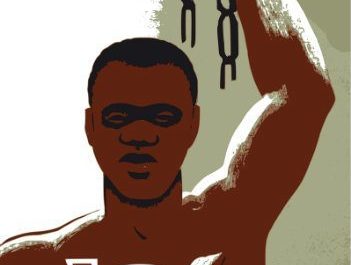A Look At Alex Haley’s Roots And The Remake
When Levar Burton starred in the ABC miniseries Roots in 1977, few people likely realized the impact that Roots  would have. Millions of people watched the capture, enslavement and subsequent unfolding of the life of Kunta Kinte.
would have. Millions of people watched the capture, enslavement and subsequent unfolding of the life of Kunta Kinte.
The recent remake of Roots stars Malachi Kirby as Kunta Kinte. It presents a more realistic presentation of the enslavement of Kunta Kinte, reveals how each generation of his family lived, retelling stories that trace their ancestral Roots.
Alex Haley And The Original Roots
The miniseries “captivated the nation,” according to History, as people across the country watched the original miniseries unfold. Author Alex Haley claimed the history behind the series, first revealed in his book, “Roots: The Saga of an American Family,” came from century-old details from his own family tree, from captivity, slavery and African-American experience in the United States.
Roots opens with a focus on the life of African villagers in Juffure, particularly the 1750 birth of Kunta Kinte to Mandinka tribesman Omoro Kinte and his wife Binta Kebba. Raised as a Mandinka warrior, Kunta Kinte draws the ire of his father when he announces he wants to get a formal education. The opportunity for Kunta to realize his dream never happened. While cutting wood, the kidnappers that villagers feared, captured Kunta Kinte. He never saw his parents or his homeland of Gambia again after slave catchers forced Kunta onto a ship with other captured Africans. Even aboard the ship, chained slaves endured horrific conditions, including rape, torture, and murder.
Life In The New Country
The ship, the Lord Ligonier, arrived in Annapolis Maryland in 1767. John Waller, a Virginia slave owner, purchased Kunta Kinte, renaming him “Toby.” Kunta Kinte tried to escape several times. Slave owners cut off part of his right foot to discourage him from running away again. Kunta Kinte married Bell, a cook, and they had a daughter, whom they named Kizzy.
After the end of the Civil War and the Emancipation, details of the Mandinka ancestry were still passed down, including stories told by Alex Haley’s grandmother, Cynthia. The Kunta Kinte Heritage Festival gives further lineage of Kunta Kinte, revealing that he is the grandfather of philanderer “Chicken” George and great-grandfather of Tom Murray. Kunta Kinte is also “Great-great-grandfather of Cynthia Murray, great-great-great-grandfather of Bertha Haley; great-great-great-great-grandfather of Alex, George, and Julius Haley.”
Controversy And Courtrooms
After the success of Roots, which received numerous awards including a Pulitzer Prize, many people desired to trace their own ancestral roots. However, two people brought charges against Alex Haley.
When writing about the Roots remake, NY Daily News reporter Don Kaplan explains that Harold Courlander claimed some passages of Roots came from Courlander’s 1967 book, “The African.” Courlander’s book detailed the “Similar story of a slave’s capture in Africa,” and subsequent struggles to hold on to his own culture.
The parties settled the copyright infringement case out of court. The judge dismissed the other case for lack of evidence.
The Series Remake
The first episode of the much-anticipated Roots remake premiered Memorial Day, May 30, 2016, on A&E and History. Malachi Kirby starred as Kunta Kinte as viewers watched the remake. NBC reports on Kirby’s preparation to play Mandinka warrior Kunta Kinte, “On the set, I got down on my knees, prayed, and asked God to help me to tell the truth.” He said the role took him “On a spiritual journey.”
Kirby studied the Mandinka culture, language, and customs. Each cast member likely learned about the Mandinka in order to play his or her role in the remake. The remake depicts Juffure and some details more accurately, compared to the original Roots miniseries.
While some historians claim there are errors in Alex Haley’s Roots, many people believe his account of Kunta Kinte and his family.







